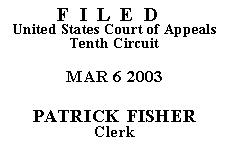

| UNITED STATES OF AMERICA, |
No. 01-2349 (D.C. No. CR-01-341-LH) (D. New Mexico) |
As above stated, the district court in denying defendant's motion to suppress concluded that the Border Patrol agent "had an objective and particularized basis to stop the vehicle." The vehicle, incidentally, was a blue Chevy pickup truck, and the search of that vehicle disclosed 235 pounds of marijuana in burlap bags which were covered by bales of hay. As also stated, the defendant was a passenger in the vehicle, which was being driven by Daniel James Eddy.
In reviewing a district court's denial of a motion to suppress, we accept the district court's findings of fact, unless they are clearly erroneous, but the ultimate determination of reasonableness under the Fourth Amendment is a conclusion of law which we review de novo. United States v. McKissick, 204 F.3d 1282, 1296 (10th Cir. 2000), United States v. Long, 176 F.3d 1304, 1307 (10th Cir. 1999).
The issue in this case is whether the agent had an objectively reasonable suspicion that the persons in the blue Chevy pickup truck were engaged in criminal activity. If the agent had such a suspicion, the stop of the other vehicle, assuming there was a "stop," was lawful. In this regard, in United States v. Cortez, 449 U.S. 411, 417 (1981), the Supreme Court spoke as follows:
Courts have used a variety of terms to capture the elusive concept of what cause is sufficient to authorize police to stop a person. Terms like "articulable reasons" and "founded suspicion" are not self-defining; they fall short of providing clear guidance dispositive of the myriad factual situations that arise. But the essence of all that has been written is that the totality of the circumstancesthe whole picturemust be taken into account. Based upon that whole picture the detaining officers must have a particularized and objective basis for suspecting the particular person stopped of criminal activity.
The district court, in the instant case, in its order listed all of the "facts" which it believed constituted "an objective and particularized basis to stop the vehicle." We do not deem it necessary to repeat here the "facts" which the court relied on. The parties in their respective briefs have itemized these facts with considerable particularity.(1) Our study of the record indicates that the district court did not err in its conclusion that the "stop" of the vehicle was "reasonable" and therefore not "unreasonable" and prohibited by the Fourth Amendment.
The present case is, in some respects, quite similar to the recent case of United States v. Arvizu, 534 U.S. 266 (2002). In that case, the Supreme Court held that, though "each act," of a series of acts, was "perhaps innocent in itself," that "taken together, they warranted further investigation," and rejected any "divide-and-conquer analysis." In Arvizu, the Supreme Court re-emphasized that in determining whether there is objectively reasonable suspicion to make an investigatory stop of a vehicle, the totality of the facts and circumstances should be considered, not individual facts viewed in isolation, one from others.
It is on this basis that we affirm the district court's denial of defendant's motion to suppress. Such being the case, we do not deem it necessary to consider whether the agent, who was driving a marked vehicle, actually stopped the Chevy pickup, or whether the driver thereof voluntarily stopped his own vehicle on the shoulder of the road and that the agent simply drove up behind the truck and, at that point in time, turned on his overhead lights.
Judgment affirmed.
ENTERED FOR THE COURT,
Robert H. McWilliams
Senior Circuit Judge
*. This order and judgment is not binding precedent, except under the doctrines of law of the case, res judicata, and collateral estoppel. The court generally disfavors the citation of orders and judgments; nevertheless, an order and judgment may be cited under the terms and conditions of 10th Cir. R. 36.3.
1.This case had its origin when the Border Patrol received information from a reliable informant, a local rancher, that a pickup truck with which he, the informant, was not familiar had been traveling on highway 338, in an isolated area, with bales of hay in the rear of the truck. Agent St. Aude was dispatched to investigate the matter.